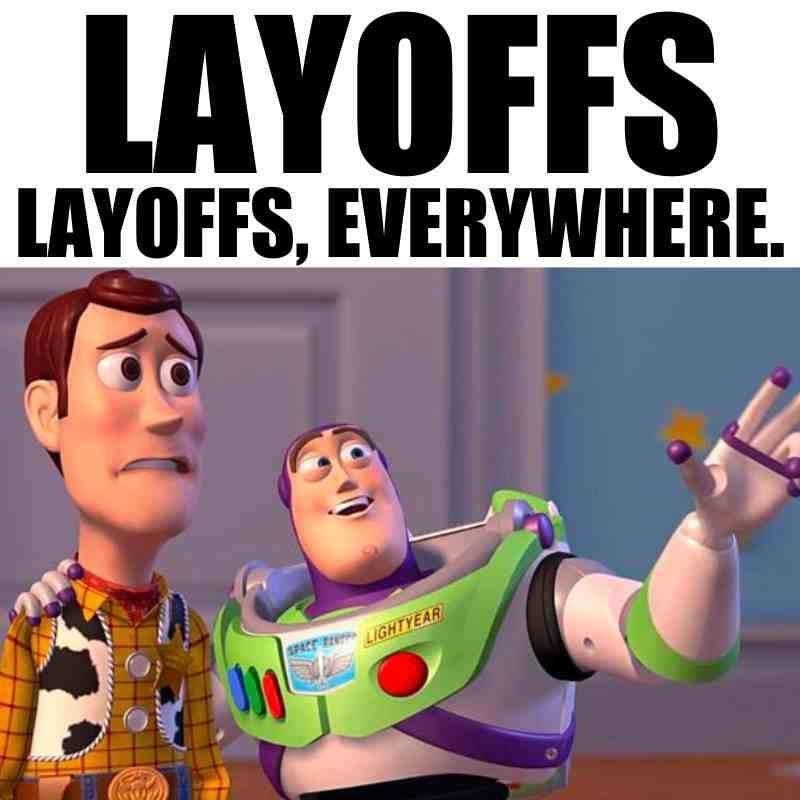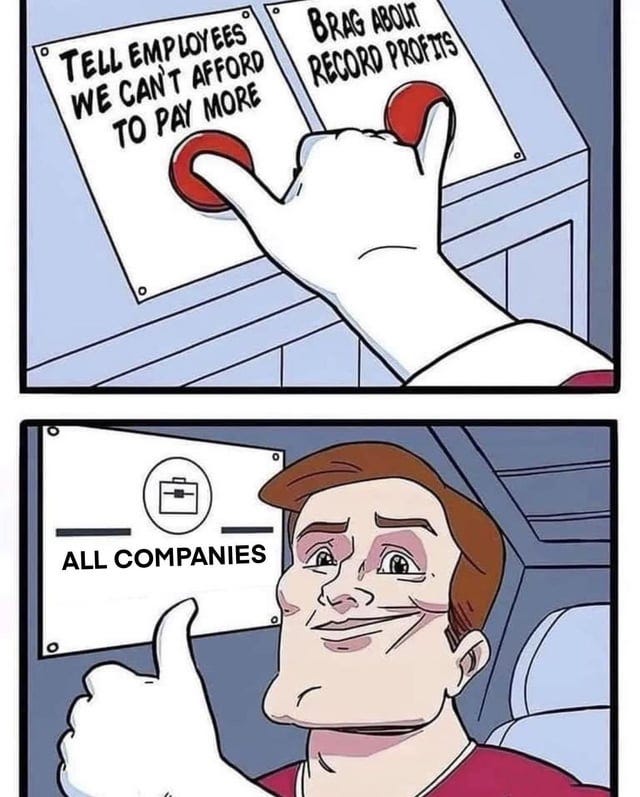Policies to Repair the Corporate Hellscape That's Devouring Our Society
Regulation to restore labor rights and worker power is the only route to healthier capital markets and society.
Lots of talk about layoffs lately. In my last post, I wrote about my experience being coldly laid off for the first time in my 30-year career by Unify Consulting while I was recovering from surgery for terminal stage 4 colon cancer instead of working with me to allow me to pursue a long-term disability claim.
The Problem
We cannot discuss the problem of layoffs without addressing the underlying issue of the power disparity between capital and labor.
There are some prevalent myths about the way employer/employee relationships function. I can only speak to these myths as they pertain to the local governance structures in which I operate: Oregon and Washington state. Both of these are “at-will” employment states.
At-will employment means either party can terminate the employment contract at will and without cause.
An employee can quit without notice or giving cause, and an employer can terminate an employee's employment at will and without cause.
Given that there are generally more people seeking employment than there are employers seeking employees, this alone creates an imbalance of power.
The disparity is even greater when employers don’t lose their income and health insurance when an employee quits.
Many people believe there’s such a thing as “wrongful termination” and that organizations are legally obligated to implement progressive disciplinary action or at least create a paper trail to justify the termination of an “underperforming” employee and prove there was no illegal or unfair bias, but none of that is true.
When I was fired, quite angrily, by the petty, little, inept tyrant VP of Supply Chain Technology “without cause” at the Seattle-based fashion retail hereditary oligarchy, I’d never even been given a verbal reprimand, much less any email paper trail or performance-improvement plan. Upon researching my options, I found that no such protections exist; there aren’t even civil penalties for companies that decide to fire you on a whim “without cause” because we’re in an at-will employment state.
In fact, one time, when I mentioned collective bargaining causing compensation to be federally protected speech, my director casually said, “Oh? I didn’t know that. Anyway, they just won’t say that’s why they’re firing you.”
At-will employment isn’t. (“That’s a nice family you’ve got there, be a shame if something happened to them.”)
Without social safety nets, there’s no such thing as voluntary employment. Can I quit my job anytime I want? Sure, I can. What happens to me if I do that?
I lose my income.
I lose my health insurance.
I become less valuable in the marketplace as nobody wants to hire unemployed people.
I am presumed to be of lower moral character or at least of lower labor value. (which is the same thing in our culture).
I begin to erode my savings/retirement and am in grave danger of total financial or even physical ruin if I or one of my children become very ill.
These all amount to a gun to the head of every worker in Washington state.
Without a right to not work, all work is compulsory.
How can we reign in these out-of-control executives?
Before going down my list, I want to say that we must end at-will employment laws. While employers can fire anyone they want without cause, none of our meager labor protections exist. Will they make up some BS to justify firing people they don’t like? Sure, they will, but if we have laws protecting employees, those made-up cases will amount to fraud, and there will be resources for victims when a company commits fraud.
A policy platform for labor rights
I propose the following governing constraints on employers:
Cost-cutting initiatives that impact workers must coincide with a provable case in which profits are down, and costs represent an existential threat to the organization.
Cost-cutting initiatives must impact top senior executive staff before lower and mid-level employees and disproportionately more than they affect lower and mid-level employees.
Layoffs must only be performed in times of provable need. If you do a layoff, you lose all your bonuses, dividends, and stock buybacks for 3 years. This includes golden parachutes. If you quit during that three-year period, there are no parting bonuses as you’re locked out due to having performed the layoff.
Executive performance in public corporations must be measured and made public. The stock market is a farce that’s easily manipulated, so executive performance measures must be meaningful operational, customer-value, and employee-retention-oriented ones. No “The stock went up, so good job, Edmond” nonsense.
Societal measures for establishing a beneficial “right not to work.”
Universal Healthcare (Should not be controversial and should be self-explanatory. Don’t @ me; I’m not interested in hearing why you think my children deserve to be broke because their father’s cancer made him briefly less profitable to Unify Consulting Inc.)
Universal Basic Income. Yes, controversial but every experiment in UBI showed a societal benefit and no loss of productivity. The fact is that productivity has grown massively in the last 50 years, but we’re working harder and longer hours than ever with fewer rights and a smaller percentage of our own marginal product than ever. Keynes said this would happen but would result in people working fewer hours, but he didn’t foresee the rise of the American billionaire. We currently have a record number of these.
Universal Basic Job. Our underfunded local, state, and federal government has many jobs in every imaginable field that it struggles to fund and staff. If I could decide not to work for some inept tech-bro douche who’d just been handed the keys to a large supply chain tech org by his bros despite having no expertise and the maturity of a petulant toddler and go do some good for my state or country applying my expertise for a thriving wage, I’d have left instantly.
No more liability protections for privately owned corporations. If you want the “meritocracy” you’re so confident you’ve earned, stop hiding behind the government you don’t want regulating you when you destroy the environment, defraud investors, or abuse your employees. You wanna be "free,” then when you do harm, you lose your personal wealth. If you want corporate liability protections, become a worker-owned and governed co-operative. Employees will decide the levels of risk, damage to the environment, and, most importantly, the distribution of marginal product through the organization.
Without these constraints on power, we’ll never have the healthy markets capitalism pretends to offer. We need to stop these people from leveraging their existing wealth supremacy power and using it to destroy the fabric of our society for their personal gain.
I know lots of conservatives will start mewling, “But how will we pay for it?!” and the answer is by raising the minimum corporate tax rate to Eisenhower levels and taxing the wealth of our over 800 billionaires. All of this spending would create a healthier distribution of resources, empowering lower and middle-income people to grow the economy and likely result in double-digit GDP growth. Everyone but the people hoarding a thousand lifetimes worth of wealth would benefit from this in myriad ways, and even those billionaires would only suffer from being slightly less insanely rich.
Also, check out Stephanie Kelton’s great book about deficit spending for more about funding our private sector with government deficits.




